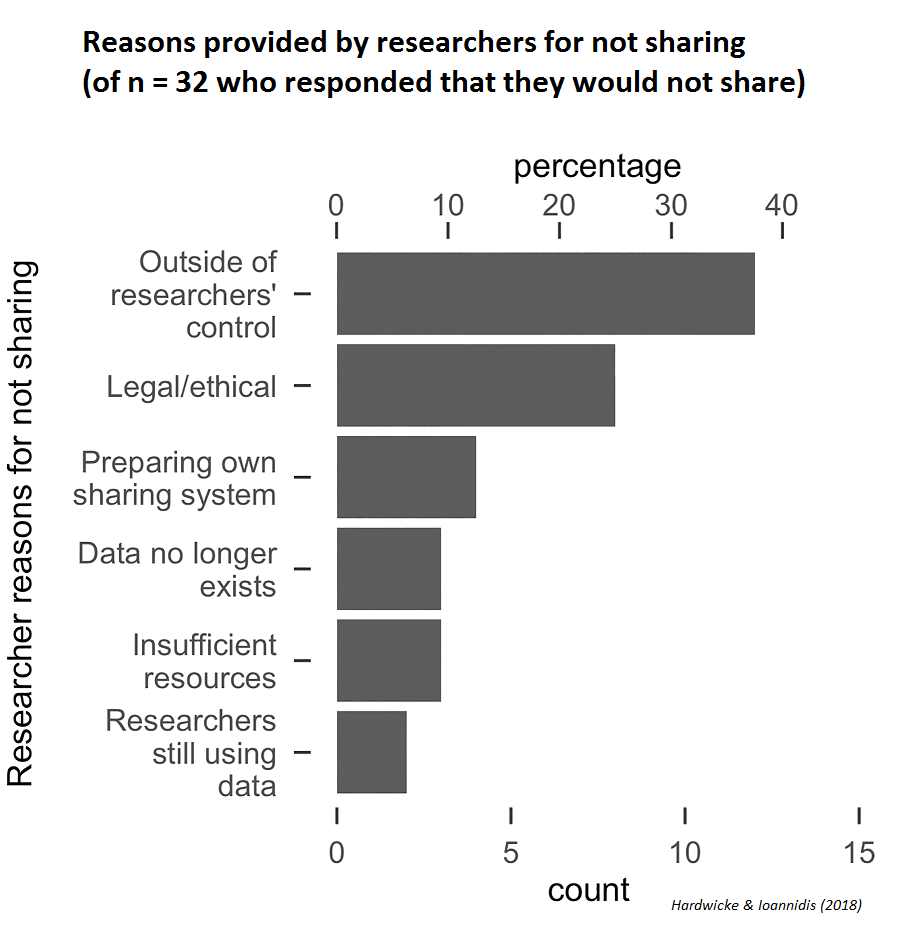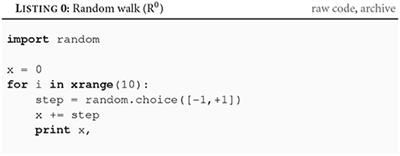Google Unveils Search Engine for Open Data
The tool, called Google Dataset Search, should help researchers to find the data they need more easily.
Send us a link
The tool, called Google Dataset Search, should help researchers to find the data they need more easily.
A set of complementary guides covering the main aspects of depositing software into digital repositories.
The Open Science movement champions transparency, but how much and how quickly is a matter of dispute.

Only about 20% of statements indicate that data are deposited in a repository, which the PLOS policy states is the preferred method. More commonly, authors state that their data are in the paper itself or in the supplemental information, though it is unclear whether these data meet the level of sharing required in the PLOS policy.
In a slightly depressing new paper, researchers describe how they tried to get access to the data behind 111 of the most cited psychology and psychiatry papers published in the past decade. Only 14% of the datasets were made available with no restrictions on who could access them.

Who benefits from sharing data? The scientists of future do, as data sharing today enables new science tomorrow. Far from being mere rehashes of old datasets, evidence shows that studies based on analyses of previously published data can achieve just as much impact as original projects.
In the 1990s, the Internet offered a horizon from which to imagine what society could become, promising autonomy and self-organization next to redistribution of wealth and collectivized means of production. While the former was in line with the dominant ideology of freedom, the latter ran contrary to the expanding enclosures in capitalist globalization.
Opendata.ch/2018 ist die führende Konferenz der Schweiz rund um das Thema offene Daten. Jährlich prägen wir die nationale Open-Data-Diskussion, mit VertreterInnen aus Verwaltung, Wirtschaft, Wissenschaft, Politik, Journalismus, IT und weiteren Interessengebieten.
After being given the green light by research ministers earlier this year, an ambitious initiative to enable Europe’s 1.7 million researchers to share data and research tools is now on course to be launched before the end of the year. But what should the next steps be?
Detailed recommendations and specific actions for different stakeholders for making FAIR data a reality.
The new exposure of peer review information through its public API provides opportunities for discoverability, analysis, and integration of tools.

The European Open Science Cloud, which will support EU science in its global leading role by creating a trusted environment for hosting and processing research data.

Wellcome new Open Research Fund supports innovative approaches that enable data, code or other research outputs to be discovered, accessed and reused.

Making data available to the larger scientific community has many benefits.
Response to a proposed rule announced by the Environmental Protection Agency (EPA) in a 24 April 2018 press release.
In one of the largest surveys of researchers about research data (with over 7,700 respondents), Springer Nature finds widespread data sharing associated with published works and a desire from researchers that their data are discoverable.

An overview of the landscape of online data infrastructures, and highlight the key points to consider when using open data.
A free, open-source, online application that helps researchers create data management plans complying with funder requirements.

Organizations launching OA journals have many choices to make. What are their technology options?

Science Europe and the Netherlands Organisation for Scientific Research have launched an initiative for the voluntary international alignment of research data management policies.

If clinicians are expected to change their practice based on their reading of medical journals, they need to know that the evidence in published papers can be verified.

What happens when you cite someone’s research? Have you ever wondered what happens with citation data that you produce and how it is being used by others? Citation data is not released automatically - by default the references are hidden from the public eye and can only be obtained from Crossref with specific consent from the publisher.

The dataset provided by the SNSF contains publication fees for 302 articles. Total expenditure amounts to 514'522 EUR and the average fee is 1'704 EUR.
The unsustainable nature of the digital data landscape, the quality and credibility of the data themselves, and how data sources currently represent only privileged individuals, are challenges that can be overcome, but to do so requires significant investment in key data governance priorities.

Society clearly benefits from innovation and creativity, and therefore has a vested interest in ensuring that such behaviors are rewarded while not stifling future innovation.

"Truly open scholarship also requires that bibliographic references be freely available for analysis and reuse", says David Shotton, co-director of OpenCitations.
Article enumerating five characteristics that a scientific code in computational science should possess.

Based on Crossref Data (2014-2017) - 42,339 Journals - 12 Million Articles - 36 Million Citations.